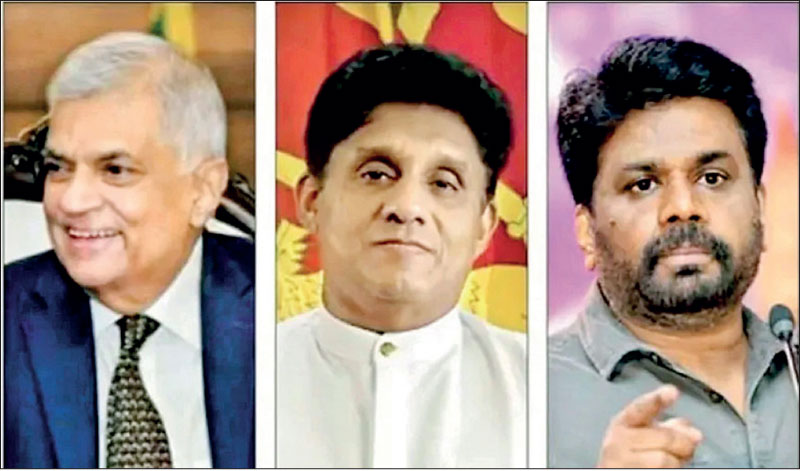Friday Feb 20, 2026
Friday Feb 20, 2026
Wednesday, 18 September 2024 01:57 - - {{hitsCtrl.values.hits}}

The three candidates vying to be 9th President of Sri Lanka
 As Sri Lanka prepares for its upcoming Presidential election, the stakes have never been higher. In 2022, the country faced an unprecedented economic crisis that brought the nation to a standstill, marked by fuel shortages, soaring inflation, and widespread protests. Since then, the country has taken steps toward stabilising the economy, but much remains to be done. This election is not just about choosing a leader but about securing the nation’s future and ensuring continued recovery from the devastating economic collapse.
As Sri Lanka prepares for its upcoming Presidential election, the stakes have never been higher. In 2022, the country faced an unprecedented economic crisis that brought the nation to a standstill, marked by fuel shortages, soaring inflation, and widespread protests. Since then, the country has taken steps toward stabilising the economy, but much remains to be done. This election is not just about choosing a leader but about securing the nation’s future and ensuring continued recovery from the devastating economic collapse.
The road to recovery has been difficult, but significant progress has been made since 2022, largely supported by the International Monetary Fund (IMF) program. However, Sri Lanka remains vulnerable, and the next president must navigate the country through this challenging period with a steady hand. Voters, therefore, must consider candidates who possess the qualities necessary to complete the recovery process and set the nation on a path to sustainable growth.
Economic stability
A clear and credible vision for economic recovery is essential, especially given Sri Lanka’s gradual progress since 2022. The IMF program has provided critical financial support and outlined economic reforms aimed at stabilising the country. Inflation has been brought under control, and debt restructuring has begun, but significant challenges remain. The next president’s vision must include reforms in public sector efficiency, policies that attract foreign investment, and strategies to stimulate domestic industries such as tourism, agriculture, and technology.
Greece’s recovery from its debt crisis—through a combination of austerity measures and structural reforms—demonstrates how sustained focus on recovery can lead to renewed stability and growth. Similarly, Singapore’s economic transformation through clear policies offers a strong model for Sri Lanka’s potential recovery.
Social welfare
The economic crisis of 2022 hit the poorest segments of Sri Lankan society hardest. Rising inflation and unemployment put immense pressure on vulnerable populations. While the IMF program has stabilised the economy, the next president must ensure that economic reforms do not disproportionately affect these groups. Investment in social welfare programs, healthcare, and education is critical for inclusive growth. Policies must be designed to uplift all segments of society, particularly those still struggling in the aftermath of the economic collapse.
Decision-making ability
Sri Lanka requires a leader capable of making difficult, sometimes unpopular, decisions for the greater good of the nation. The challenges posed by the IMF program, including fiscal tightening and structural reforms, require careful management and clear communication with the public. Effective leadership is crucial for implementing reforms that benefit the country while protecting its most vulnerable citizens. Historical figures like Franklin D. Roosevelt, who led the United States through the Great Depression, and Margaret Thatcher, who revived the British economy in the 1980s, underscore the importance of strategic leadership during economic hardship. Sri Lanka’s next president must possess similar resilience and determination to guide the nation through this transformative period.
Credibility
Restoring public trust will be vital for the next president. The 2022 crisis exposed deep-rooted corruption and mismanagement that contributed to Sri Lanka’s economic collapse. While the IMF program has introduced stricter oversight and fiscal transparency, the next president must embody these values and implement further anti-corruption measures to ensure long-term accountability and governance.
International relations
Sri Lanka’s strategic location in the Indian Ocean places it at the heart of critical geopolitical relationships. The next president must maintain and strengthen partnerships with key global players, including India, China, and Western nations, while safeguarding the country’s sovereignty. The IMF’s involvement highlights the importance of international cooperation, and the next leader must manage these relationships carefully to ensure Sri Lanka’s recovery without becoming overly reliant on external powers. Securing trade agreements, attracting foreign investment, and diversifying economic partnerships will be crucial for sustainable growth.
Track record
A candidate’s track record in public service is a crucial factor. The 2022 crisis demonstrated the devastating consequences of poor governance and a lack of accountability. The next president must have a proven ability to implement reforms, manage crises, and govern transparently. Voters should closely examine each candidate’s past performance, particularly their ability to lead during challenging times and their commitment to ethical governance.
Innovative thinking
Sri Lanka’s recovery demands not only fiscal discipline but also innovative thinking. The next president must be able to adapt to global trends like digital transformation, climate change, and technological advancements. These modern challenges require forward-thinking policies to position Sri Lanka for long-term success. Countries like Estonia have embraced digital innovation to drive governance efficiency and business growth. Sri Lanka’s next leader must similarly adopt new technologies and innovative solutions to improve public services and drive economic development.
National unity
National unity will be essential for Sri Lanka’s sustainable recovery. The 2022 economic crisis exposed social tensions, and the next president must prioritise reconciliation and inclusiveness. Ethnic and religious divisions have long been a challenge in Sri Lanka, but they cannot be overlooked during this critical period of recovery. A leader who fosters national unity, respects diversity, and promotes social cohesion will ensure that all Sri Lankans participate in the recovery process.
Conclusion
Sri Lanka has made significant strides toward recovery since 2022, but the country’s progress is fragile. The upcoming election is a turning point, and the leader chosen will play a pivotal role in determining whether Sri Lanka continues on its path to stability and growth. By evaluating candidates based on their vision, integrity, and ability to navigate the challenges ahead, voters can make an informed decision that secures the nation’s future. Now, more than ever, Sri Lanka needs a leader with the strength and vision to guide the country through this crucial time. In the final analysis, people must care about politics, because it impacts their lives or those they care about. The truth is that Sri Lanka could really use a hero.
References:
https://www.dailynews.lk/2024/07/12/featured/586431/sri-lanka-at-a-crossroads-in-a-time-of-recovery/
https://www.cbsl.gov.lk/en/news/imf-executive-board-concludes-2024-article-iv-consultation-with-sri-lanka-and-completes-the-second-review-under-the-eff
https://youtu.be/52H4FVGF2YQ?si=LiOJDHinsUAfp5cQ
(The writer teaches accounting and finance at a UK university.)